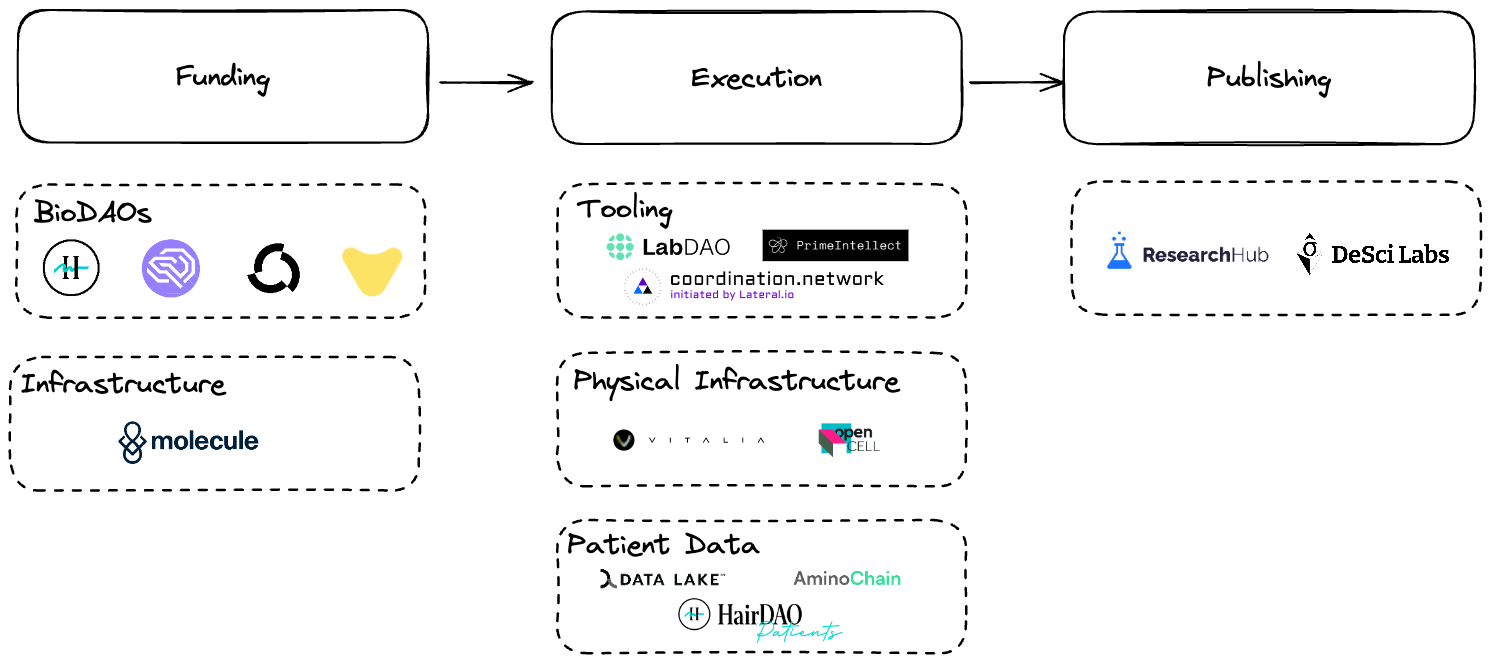The DeSci value chain
The way I currently see it, the DeSci value chain can be broken down into 3 main parts: the funding of research, the execution of it and the publishing of results.

Funding
There are two main funding gaps across early stage scientific research today. The first is at the basic research stage, where funding predominantly originates from the government and certain areas of science repeatedly receive very little of that funding. The second funding gap is at the stage where entrepreneurs attempt to translate promising basic research into practical applications or commercial products. This is called the “valley of death,” which is characterised by a lack of funding for projects that have shown promise at the earliest of stages but are not yet de-risked enough for private investors or industry partners.
BioDAOs are new sources of capital that promise to plug both of these funding gaps. As I’ve written about before, Bio DAOs are patient owned online organisations that directly fund and develop IP, and help translate that IP into a therapeutic. They are platforms for the creation of drugs that their members want to see in the world.
Companies like Molecule, and standards like the IP-NFT and IPT, are pieces of infrastructure that facilitate these new funding avenues by making scientific IP more easily transferable and liquid.
This part of the DeSci value chain is where the majority of entrepreneurial activity and funding has happened so far.
Execution
Research today primarily gets done within academic institutions or other permissioned environments. At its core, DeSci is about disintermediating those gatekeepers and decentralising the ability of conducting research to the edges.
Companies like LabDAO, coordination.network and PrimeIntellect are building software to cater to this new mode of research. While the decentralisation of the sciences can be empowering, it also raises some new questions. If research is done online in collaboration between people that don’t necessarily know each other, how is ownership of IP determined? In what jurisdiction does IP reside? Do new tools need to emerge that take into account novel team constructions and workflows?
While most of the attention so far has focused on the digital part of DeSci, the physical side can’t be overlooked as the ultimate goal of DeSci is to bring new drugs and therapeutics to market. Vitalia seeks to help bio companies do so by leveraging the physical infrastructure of new cities like Próspera in Honduras, which is a special economic zone with a more favourable regulatory environment to conduct research, run clinical trials, and administer new treatments. Companies like Opencell grant researchers flexible access to lab space. It’s also possible that in the future Bio DAOs themselves set up their own labs through which they can run their research.
Connecting patient data with researchers continues to be a large unsolved problem. Pharma companies spend billions of dollars every year to access data they need for R&D but are still underserved. One of the reasons is that market for patient data is fragmented and lacks visibility. Companies like Data Lake for medical data, and Aminochain for bio samples, attempt to solve that problem by creating marketplaces that directly connect data suppliers with data consumers. Patients truly own their data and benefit monetarily from allowing that data to be used in studies, while researchers have an open marketplace through which they can purchase the data they need. There have been several unsuccessful attempts to solve this problem, but I believe that a web3 company can finally provide the winning solution.
Publishing
The scientific publishing model today is fundamentally broken. Despite this, the primary objective for most researchers remains to have their work published in scientific journals, as that's essential for advancing their careers. Achieving tenure at a university or securing grant funding is linked to how many times researchers have had their work published in journals.
What research gets published and and on what terms is decided by an oligopoly of publications.
This creates several perverse incentives. The first is that researchers frequently prioritise pursuing studies that are more likely to generate citations rather than focusing on research that has a higher likelihood to generate cures for diseases. The second is that the pressure to publish incentivises researchers to skew studies in pursuit of “correct” results, as negative results don’t get published. This contributes to the ongoing replication crisis in the sciences, wherein up to 60% of published research cannot be reproduced by others.
On top of that, publicly funded research gets paywalled and often time researchers themselves need to pay publications to publish their work.
Companies like DeSci Labs and Researchhub are attempts to break that oligopoly by bringing research onchain. Research that’s onchain, and not just online, is open for anyone to access and composable, meaning it can easily link to and build on each other.
While these products provide the tools to bring research onchain, they don’t yet provide the incentives. New reputation systems need to emerge to get researchers more comfortable with publishing onchain and forgoing traditional publications that are both predatory but beneficial for their careers.
DeSci is an emerging and incredibly fast growing space. I’m sure this value chain will look out of date in just a couple of months and I’ll try to update it as my thinking around the space develops.
